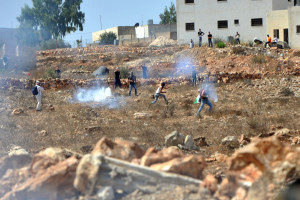
- Credit: IDF
Nebi Saleh, October 22 - Palestinian stone- and firebomb-throwers confronting Israeli troops in and near this village north of Jerusalem face a stark choice in recent months: continue to blend in among children and other non-combatants, thus risking the spread of COVID, or adhere to precautions that minimize such proximity, thus rendering themselves separate from the noncombatants and easier for IDF personnel to neutralize them without harm to the non-combatants.
Nebi Saleh has long served as a flashpoint for clashes between protesters and the IDF, but distancing guidelines issued by the Palestinian Ministry of Health in nearby Ramallah mandate at least two meters of space between members of different households. Such restrictions on conduct in the public space makes it difficult, if not impossible, for significant numbers of violent demonstrators to use women and children as human shields, several veteran demonstrators reported Thursday.
"I've been confronting the occupation soldiers for years," observed Faisal Tamimi, 22. "But it's different now. Fewer demonstrators are willing to engage in that confrontation unless closely accompanied by young children, a pregnant woman, or an old lady. The soldiers are reluctant to shoot at us like that, but we're also reluctant to hurl things at them without that protection. We haven't had anyone shot this year at all, and that's put a serious damper on our propaganda. With no wounded children to show, there's less outrage-generating material for our advocates to share around the world, and our cause attracts less and less support."
Demonstrators' concerns go beyond the simple realm of activism and publicity. "If the troops arrest someone, the government in Ramallah pays the family," explained Fares Tamimi, a cousin. "But social distancing means fewer people participating in the Molotov-cocktail-throwing, which means fewer people getting shot at, which means fewer people getting injured, and with lower participation overall, that means fewer arrests and thus less revenue. We're talking about livelihoods here. Just like almost everywhere else in the world, social distancing and lockdown policies are destroying the economy."
Even before the official restrictions went into effect, Tamimi clan members felt a difference in atmosphere. "It used to be automatic that some of us would get in the solders' faces," recalled Ahed Tamimi, whose blonde hair and blue eyes have featured in numerous Palestinian photos and clips aimed at generating sympathy from Western activists. "Can't do that now. We have to assume the occupiers are deploying coronavirus-positive soldiers to infect us. We might declare day and night that our highest goal is martyrdom for Palestine, but when we say that we're thinking of going out in a single moment, a blaze of glory. Suffering for weeks in isolation as our respiratory systems fail isn't the kind of shaheed I want to become. There's a limit to my ambitions in that respect."

 Elder of Ziyon
Elder of Ziyon






















